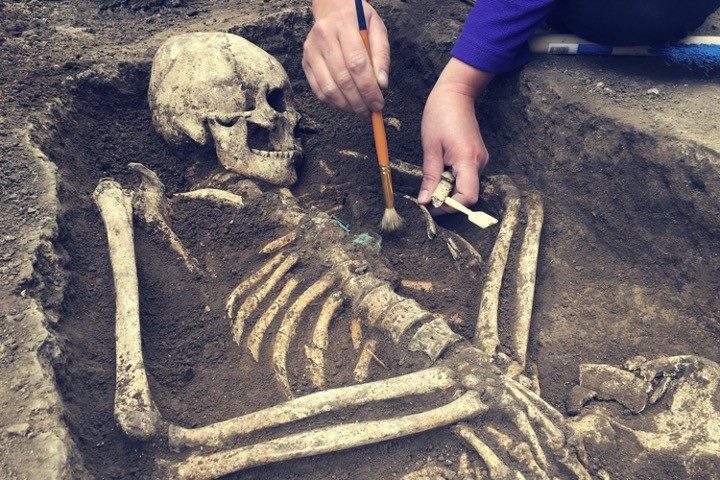
There’s no bones about it: The University of Pittsburgh (UoP) is not getting its money’s worth from at least one of its academics. It’s hard escaping this conclusion after Professor Gabby Yearwood insisted, during a recent UoP event, that an expert cannot determine a person’s sex by examining the individual’s bones.
Of course, this is regularly done when examining murder victims’ skeletal remains.
One might now assume Yearwood’s specialty is education or “gender” studies. But, no, it’s anthropology. In fact, he has a Ph.D. in the subject — as he reminded everyone after event attendees understandably met his claim with laughter.
The fanciful statement was made during a dispute with female swimmer Riley Gaines. As Fox News reports:
Gaines became a national figure when she objected to trans swimmer Lia Thomas participating in women’s sports, helping propel a national conversation about whether it is fair to … women to allow those born as men to compete.
…A video went viral of a confrontation during the Leadership Institute event when Gaines asked senior lecturer at the school’s anthropology department Gabby Yearwood, “If you were to dig up two humans one hundred years from now, both man and woman, could you tell the difference, strictly off of bones?”
“No!” the professor replied as the room erupted in laughter.
The professor then responded to the laughter with shock, wondering how he could be doubted when he was “the expert in the room.”
“Have any of you been to anthropological sites? Have any of you studied biological anthropology? I’m just saying, I’ve got over 150 years of data, I’m just curious as to why I’m being laughed at,” he said before later declaring, “I have a PhD!”
The different bone structure between male and female humans has been a mainstay of anthropological study and forensics, though some parts of modern academia are now denying this observable difference in order to cater to transgender ideology.
For the record, Britain’s Natural History Museum lists seven differences between male and female pelvises alone, with women having, among other things, “a wider subpubic angle,” “a broader sciatic notch,” “a subpubic concavity,” and greater width in general.
There are also “a lot of characteristics on the skull that can be used to determine sex,” the museum further states. There are six mandible-related sex differences, too.
Moreover, researchers “have devised a way of determining whether a person is male or female just by analyzing measurements from seven foot bones,” wrote Live Science in 2012.
Overall, sex determination was made with 70.56 percent accuracy just by examining the skull alone, wrote PubMed, relating study findings in 2005. What’s more, “Sex was correctly estimated by the experienced anthropologist in 100% of individuals using all of the 16 pelvic and cranial criteria,” the site further states. “In fact, sex differences in pelvic morphology were large enough to allow sexing the individuals with 100% accuracy.”
In fairness, though, the above specifies “experienced anthropologist,” and Yearwood was asked, “If you were to dig up two humans … could you tell the difference…?” Maybe the professor is just in the wrong business.
To conclude, there are even subtle differences in infants’ and children’s skeletons indicative of sex, though they’re not as definitive. However, DNA and peptide analyses can be used in children’s cases for sex determination, relates the Forensic’s Blog.
Unfortunately, Gaines made her own mistake in responding to Yearwood. That is, while mentioning some of the aforementioned sex-related skeletal differences, she also claimed that men “have an extra rib.” This is untrue. (Note: We must endeavor to be accurate; the mainstream media regularly emphasize conservatives’ errors to make them appear dumb.)
A short video of the Gaines-Yearwood exchange is below, though it’s hard deciphering what’s said.
Quite predictably, observers were incredulous at Yearwood’s false claim. For example, the Independent Women’s Forum tweeted, “When the self-proclaimed ‘expert in the room’ is offended that his assertion that males & females don’t have distinct skeletal differences is laughable, one might wonder what students studying anthropology at the University of Pittsburgh are being taught by their professors?”
But one doesn’t have to wonder. Aside from teaching a course called “Activist Anthropology” (description here), Yearwood also “directs the [UoP’s] law school’s Center for Civil Rights and Racial Justice,” informs The College Fix. “His research interests include ‘the social constructions of race and racism, masculinity, gender, sex, Black Feminist and Black Queer theory, anthropology of sport and [the] Black Diaspora.’”
In other words, as with “sex researcher” and pedophile Alfred Kinsey, Yearwood is peddling social activism in (pseudo)science’s name.
Such modern-day Lysenkoists do sow confusion, too. Just consider the New York Post, normally a sane paper. Providing what’s fancied perspective, its Natalie O’Neill claimed Friday that sex determination isn’t always definitive. Writing of the fallacious “intersex” concept, she stated that such people “have neither XY nor XX chromosomes,” but “some combination of XXY.”
While there’s X0 as well, actually, in reality and as WebMD explains, all these chromosomal abnormalities affect one sex or the other.
For example, XXY is “Klinefelter syndrome, “a genetic condition in which a boy is born with an extra X chromosome” (emphasis added), writes WebMD.
Bottom line: “Intersex” is not a scientific designation, but a social one. It’s fantasy, not reality.
But there are today plenty of fantasy peddlers, including in the classroom. And now we know you can be instructed by one at the University of Pittsburgh — all for a mere out-of-state cost of $51,432 a year.



